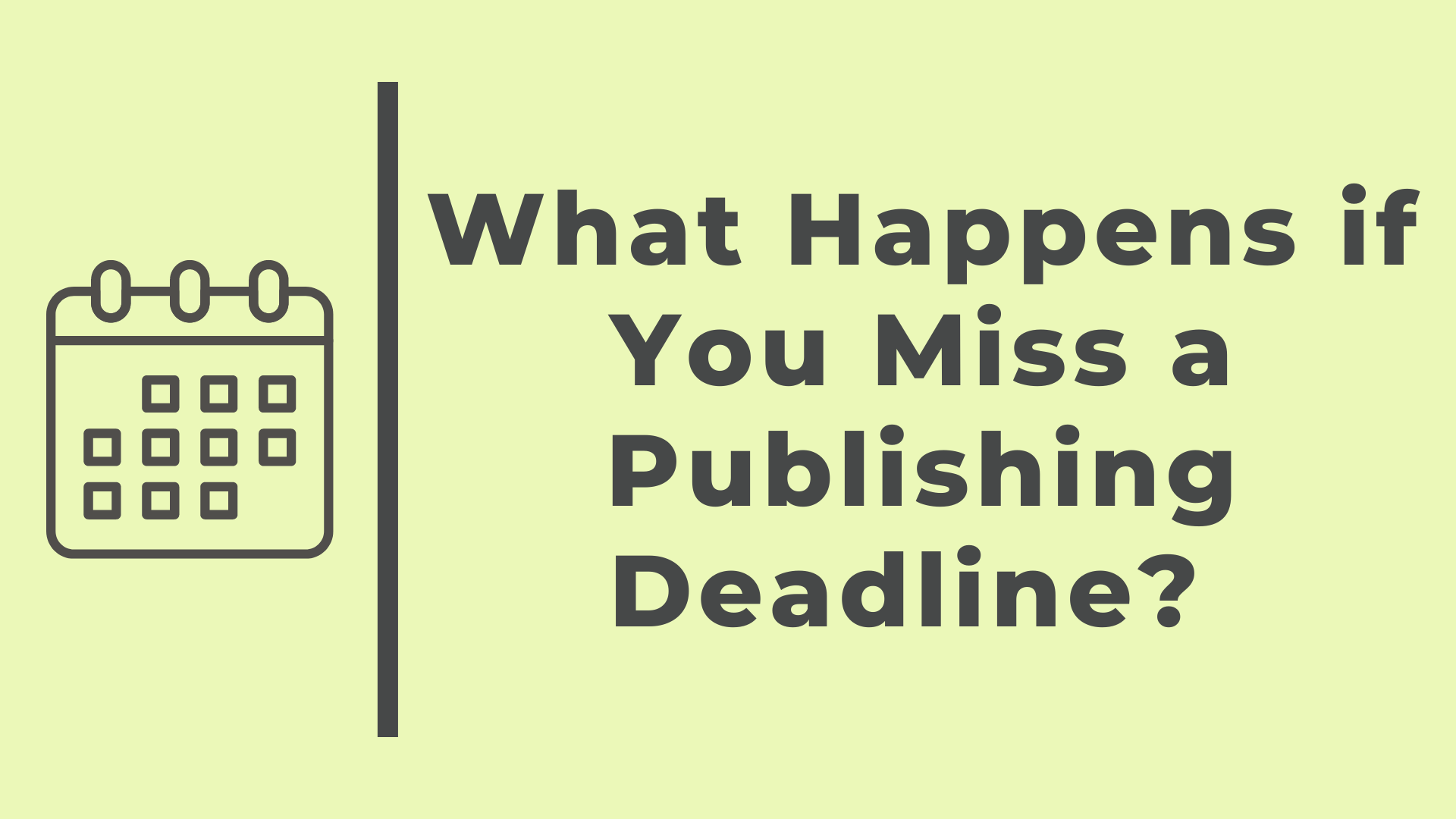If you’re an academic author trying to publish a book, I think you may relate to the following scenario:
Have you ever told someone (such as an editor) that you’d send them something by a particular date, and then the date came and went and you felt sort of bad but didn’t want to draw attention to the fact that you didn’t send the thing, so you didn’t say anything and then months (or years) went by, and maybe you even finished the thing you said you’d send, but so much time elapsed and your shame became so compounded that you never sent the thing at all, and now you feel as if you completely botched the opportunity that seemed like a great idea when you first committed to send the thing?
If this (completely hypothetical) experience has ever happened to you, you’re definitely not alone. In this post, I’m going to run through some typical situations where scholarly book authors stress out about being late, and let you know how much you should actually be stressing out.
Here’s one such situation: let’s say you talk to a publisher about your book project. Maybe an editor reaches out to you via email, or you have a nice conversation at an academic conference. They ask you to send them a proposal or sample chapter. Maybe you discuss what seems like a reasonable timeline and you agree that you’ll send them something in six weeks. But then life / Covid / geopolitical crises happen and you aren’t able to send it within six weeks.
Have you blown an important deadline and tanked your chances with this editor and press?
The answer is almost definitely no. At this very preliminary stage — when little labor has been invested and no contracts have been signed — “due dates” aren’t really deadlines. The editor likely just set a timeline so that you’d have some mild motivation to actually get back to them or so they could remember to circle back with you if they didn’t hear from you.
My advice: if you are still planning to send the editor something eventually, just drop them a quick note to acknowledge that. If you can do this close to the date you’d set, that’ll be good, but if more time has gone by, it’s still ok.
You don’t have to apologize profusely, just let them know you’ve been delayed but that you will be in touch. You can set a new date if you want, or just give a ballpark timeline (and be honest/realistic). In all likelihood, the editor will be very glad to hear from you and will not be at all upset that you need to change the timeline.
If no date was set in the first instance — let’s say the editor just said something like “get in touch with me when you have your manuscript done” — then there’s really no deadline.
Take as much time as you need to (several years, if that’s what it takes) and then go ahead and get back in touch. There are no guarantees that the editor will still be able to pursue the project — they may have even changed jobs by that point — but you have nothing to lose by reaching back out, even if a lot of time has gone by. The editor will not judge you for taking a long time. Almost everyone and everything in academic publishing takes a long time.
Here’s a different scenario involving publishing due dates that comes up a lot for the authors I work with: let’s say your proposal and sample chapters (or even full manuscript) have been through peer review. Your editor asks you to write a response memo to the peer reviews and says they would like it back from you in a week (or two weeks, or maybe doesn’t give you a specific timeline).
How important is it to get it back to them quickly? What if you need more time?
This is one of those timing things that can be confusing and irritating to authors. You may have had to wait several months for the peer reviews to be returned and suddenly you’re expected to respond within just a few days. How is that fair??
The reason the editor is asking you to turn around your response so quickly is that they are getting prepared for the meeting at which they’ll be presenting your book for approval by the next level of decision-makers at their press. This might be an internal committee or the faculty editorial board.
Your editor is not trying to rush you—they are trying to get an offer on your book approved at the earliest opportunity. If they don’t have your response in time to prepare their presentation to the committee, you’ll both have to wait until the next time the committee meets (which could be weeks or months down the road, depending on the press).
My advice in this scenario: first, check out my tips on how to respond to peer reviews (which you can find here and in Chapter 13 of The Book Proposal Book).
Then have an honest conversation with your editor. If you think you need more time to write an effective response, they should be ok with that. If they are truly in a rush, hopefully they will be able to explain why speed is so important in this case and they should be able to give you some guidance to expedite your memo-drafting (e.g. telling you which points from the reports are most important to address).
How about this one: your book is under contract and you’ve been given a specific date by which you must submit the full manuscript.
What happens if you aren’t ready to submit the manuscript by that date?
Again, your best bet here is to get in touch with your editor and communicate honestly about any delays as early as possible. You may be able to negotiate a new timeline with them.
Believe me when I say that your editor has probably accepted manuscripts that are far more delayed than yours (no matter how late you think you are). Don’t let embarrassment be the reason you don’t get in touch. The longer you’re silent, the weirder it’s going to get (but again, you are probably far from causing the weirdest situation your editor has dealt with).
If a lot of time has gone by (like, years) it is possible that your editor may have left the press or the press’s publishing agendas have shifted. Hopefully your project will still be of interest to them, but since you didn’t keep up your side of the contract (e.g. submitting the completed manuscript when you said you would) it is technically possible they will no longer want to publish the project.
I think this would be a pretty exceptional occurrence, but if this is the feared outcome that’s keeping you from getting in touch about missing your due date, let me just say that if your publisher doesn’t want to publish your book anymore, it’s much better for you to know that sooner than later. For one thing, you won’t have the deadline hanging over your head anymore. And you’ll be freed up to take the project elsewhere when you’re ready.
The other due dates you’ll probably encounter as you work toward getting your book published will happen after you submit the full manuscript and it gets final approval.
At that point your project will be moved into the production pipeline where it will undergo copy editing and typesetting. When the copy edits come back, you’ll probably be asked to review and approve them within a matter of weeks. The same will be true when your proofs come back from the typesetter and you’re asked to proofread them and create your index (or have your index created by someone).
The turnaround times you’re given during the production phrase will probably feel frustratingly tight, especially given how long some of the other phases of the process have taken. But unfortunately these are typically the least negotiable of the due dates you’ll receive. That’s because once the production process has been put in motion, delays on your end can cause real problems (including financial losses) for the publisher.
My best advice for dealing with these deadlines is to try to plan for them as far in advance as possible. Once you turn in your finished manuscript, the production editor assigned to your book (which might be your acquisitions editor depending on the size of your press) should be able to give you an estimate of when you’ll get copy edits and proofs back and how long you’ll be given to turn them around. Then you can block those weeks off in your calendar to try to ensure you’ll be able to devote the needed time for what you’ll need to do.
This strategy won’t prevent unexpected emergencies from interfering, but at least you can try to set yourself up for success. (To see a typical timeline for the production phase, see this post.) And again, the same refrain rings true: if you need to miss the deadline for some reason, prompt communication about it will be much appreciated.
If you’ve set yourself an internal deadline to finish a book proposal and land yourself a contract, I can help! My online programs provide guidance and structure so you can meet your goals efficiently and with the confidence that you’re doing everything you need to. I offer interactive and self-paced programs to work with every timeline.

